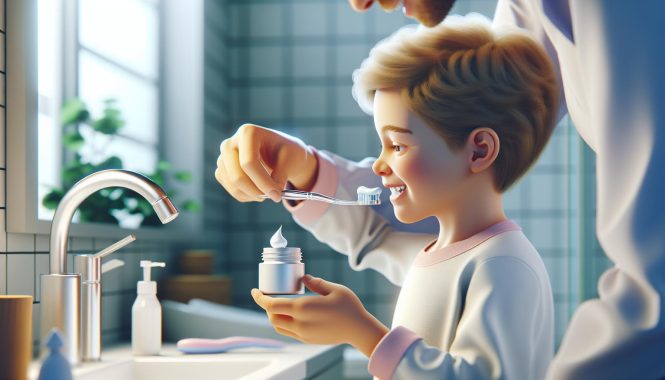

Dental Care and the Role of Fluoride is fundamental to maintaining good oral health. Fluoride, a naturally occurring mineral, plays a significant role in strengthening tooth enamel and preventing tooth decay, often known as cavities. However, while fluoride is generally beneficial, understanding its potential risks is also essential. This comprehensive guide will delve into the benefits of fluoride in dental care, exploring how it works, its efficacy, and the potential risks, ultimately providing a balanced perspective for making informed decisions about your dental health. This article will explore the specific ways fluoride contributes to strong teeth and overall oral health, highlighting the importance of preventive dentistry practices. We’ll also look at the potential side effects and discuss alternative methods. Finally, we will provide actionable insights and recommendations to help you incorporate fluoride into your routine effectively and safely.
The Crucial Role of Fluoride in Dental Health
Understanding Fluoride’s Mechanism of Action
Fluoride, a naturally occurring mineral, plays a vital role in the structure and function of teeth. Its most significant contribution to dental health stems from its ability to strengthen tooth enamel, the hard outer layer of teeth. When fluoride is ingested or applied topically, it becomes incorporated into the tooth structure. This process increases the resistance of enamel to acids produced by bacteria in the mouth. The acid attacks weaken the enamel, making teeth more susceptible to decay and cavities. Fluoride, through a process of remineralization, helps repair minor enamel damage and fortifies the tooth against further acid attacks. This remineralization process is critical in the prevention of cavities, making fluoride an essential element in a preventative approach to dental health. Numerous studies have demonstrated the effectiveness of fluoride in reducing the incidence of cavities, especially in children and adolescents.
Benefits of Fluoride in Preventing Tooth Decay
The Science Behind Fluoride’s Effectiveness
Fluoride significantly enhances the resilience of teeth against the acids produced by harmful bacteria in the mouth. This acid attack is the primary culprit behind tooth decay. By incorporating fluoride into the enamel, it becomes more resistant to this acid attack, preventing the breakdown of tooth structure. This leads to a reduced risk of cavities and maintains the integrity of the teeth. Studies have repeatedly shown that fluoridated water, toothpaste, and other fluoride applications reduce the risk of tooth decay by a substantial margin. This protective mechanism extends to both adults and children, making fluoride an essential component in preventive dental care routines. Fluoride also helps strengthen the tooth structure, creating a more robust and resilient protective barrier against external attacks.
Potential Risks and Side Effects of Fluoride
Addressing Concerns Regarding Fluoride
While generally safe and effective, fluoride can pose potential risks if ingested or applied in excessive amounts. Excessive exposure to fluoride can result in fluorosis, a condition characterized by discoloration and pitting of the teeth. This discoloration is often more noticeable in children, who are more susceptible to high concentrations of fluoride in their systems. It’s crucial to understand that the levels of fluoride present in various sources can vary significantly. For instance, water fluoridation levels vary by region. Excessive exposure is not just about water; it can also come from fluoride-containing toothpaste and mouthwash, highlighting the importance of responsible consumption and use. It’s also important to understand that the effects of fluorosis are often mild and do not always pose a significant threat to oral health; however, high exposure levels can lead to more severe outcomes.
Alternative Approaches to Dental Care
Exploring Non-Fluoride Options
Beyond fluoride, other preventive strategies exist to maintain good dental health. These include maintaining excellent oral hygiene through regular brushing and flossing, a balanced diet low in sugary foods, and frequent dental check-ups. These practices, combined with responsible fluoride use (when appropriate), can contribute to a comprehensive approach to dental care. Furthermore, the use of alternative products that do not contain fluoride, such as natural toothpastes and mouthwashes, has seen increased interest among those concerned about potential risks or who wish to find alternative solutions.
Incorporating Fluoride into Your Routine
Practical Guidelines for Safe and Effective Use
For individuals who wish to incorporate fluoride into their dental routine, it is crucial to understand the recommended daily intake. This intake varies depending on age, gender, and individual needs. It is essential to carefully read product labels to understand the fluoride content of toothpaste, mouthwash, and other oral care products. For children, using fluoride toothpaste with the appropriate fluoride concentration is critical. Dental professionals can provide tailored recommendations based on individual circumstances. Using fluoride varnish as a topical treatment can deliver targeted doses to areas requiring extra protection, particularly in children and those with a high cavity risk.
What are the long-term effects of fluoride exposure?
Long-term effects of fluoride exposure depend largely on the duration and level of exposure. While fluoride is generally considered safe in appropriate doses, excessive exposure can result in fluorosis, characterized by discoloration or pitting of tooth enamel. However, this condition is usually mild and does not compromise oral health significantly. Children are often more susceptible to fluorosis due to their developing teeth and greater exposure to fluoride sources. Dental professionals can advise individuals on preventive measures and treatment strategies to manage the potential risks.
What are the best ways to maintain good dental health without using fluoride?
Maintaining good dental health without fluoride requires a proactive approach focused on oral hygiene and preventative measures. This includes regular brushing and flossing, a diet low in sugary foods, and routine dental checkups. Dental professionals can offer tailored advice and recommendations for your individual needs and circumstances.
How can I ensure I’m not getting too much fluoride?
To ensure you’re not getting excessive fluoride, read product labels carefully to understand the fluoride content. If you have concerns, discuss your oral care routine and fluoride intake with your dentist or dental hygienist. They can provide personalized guidance and advice based on your specific needs and medical history.
What are the main differences between fluoride toothpaste and fluoride mouthwash?
Fluoride toothpaste is generally used for daily brushing, delivering fluoride directly to the teeth during the cleaning process. Fluoride mouthwash, on the other hand, is often used after brushing, allowing the fluoride solution to linger in the mouth, enhancing its protective effect on tooth enamel. The exact application and effectiveness often vary based on individual needs and may differ depending on the formulation and concentration of fluoride provided by the specific products.
Frequently Asked Questions
What is the optimal amount of fluoride for oral health?
The optimal amount of fluoride for oral health varies based on age and individual needs. Consult your dentist for personalized recommendations. They can assess your oral health status and determine the appropriate level of fluoride exposure for your specific situation. In some cases, fluoride supplements might be necessary to address deficiencies. However, over-exposure to fluoride can be detrimental, hence it is best to consult a healthcare professional.
In conclusion, Dental Care and the Role of Fluoride is a crucial aspect of oral health. Understanding the benefits and risks of fluoride is key to making informed decisions about your dental care routine. By implementing preventive measures, maintaining good oral hygiene, and consulting with a dentist, individuals can significantly improve their dental health and reduce the risk of oral diseases. Remember to consult your dentist for personalized advice and recommendations based on your individual needs and circumstances.